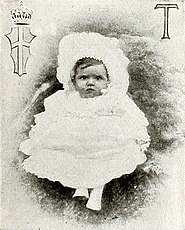Aroused from his anxious thoughts, Tillydib lifted the purse to his lap again, and was astonished to feel its weight. He opened the clasp and saw that the huge sack was actually running over with gold pieces.
“Now, where on earth did all this wealth come from?” he exclaimed, shaking his head in a puzzled way, “I ’ll go at once and pay some of the creditors who are waiting for me.”
So he ran to the royal treasury, which was a front room in the palace, and began paying every one who presented an account. He expected presently to empty the purse; but no matter how heavily he drew upon the contents, it remained ever as full as in the beginning.
“It must be,” thought the old man, when the last bill had been paid, “that my idle wish has in some mysterious way been granted.”
But he did not know he owed his good fortune to the magic cloak, which he still wore.
As he was leaving the room, he met the king and Princess Fluff, who were just come from dinner; and the girl exclaimed:
“Why, there is my cloak! Where did you get it, Tillydib?”
“I found it in the garden,” answered the lord high purse-bearer; “but take it, if it is yours. And here is something to repay you for the loan of it”; and he poured into her hands a heap of glittering gold,
“Oh, thank you!” cried Fluff; and taking the precious cloak she dropped the gold into it and carried it to her room.
“I ’ll never lend it again unless it is really necessary,” she said to herself. “It was very careless of Aunt Rivette to leave my fairy cloak in the garden.”
And then after carefully folding it and wrapping it up she locked it in a drawer, and hid the key where no one but herself could find it.
(To be continued.)
The Royal Family of Italy
By Felicia Buttz Clark.

The little Princess Mafalada.he young King Victor Emmanuel III has been a revelation to his people. Long before King Humbert was cruelly assassinated, reports were circulated that the heir to the throne was intellectually a weak man, a know-nothing; and it was common ‘talk that he would never be allowed by the Italians to reign over them. The unexpected happened, as it so often does, King Humbert was murdered on the 29th of July, 1900. His son assumed his rights without the slightest hint of trouble, and he has proved to be as intelligent, conscientious, and judicious a sovereign as United Italy has had.
The most attractive side of the King’s character is that which is shown in his home life. He married the Princess Helena of Montenegro because he was charmed with the beauty and simplicity of her character. She was to him the ideal of all that was womanly and lovable.
I remember very well that October day when the marriage of the Prince of Naples and the Princess of Montenegro took place in the small church which adjoins one of the most beautiful fountains of Rome. The long procession of magnificent state carriages passed through the Via Nazionale, between crowds of people. This was but the beginning of a very happy life. The young couple traveled all over Europe. As both of them were fond of yachting, they leisurely visited a great many points which were easily reached by water, meeting on theVol. XXXII.—51
